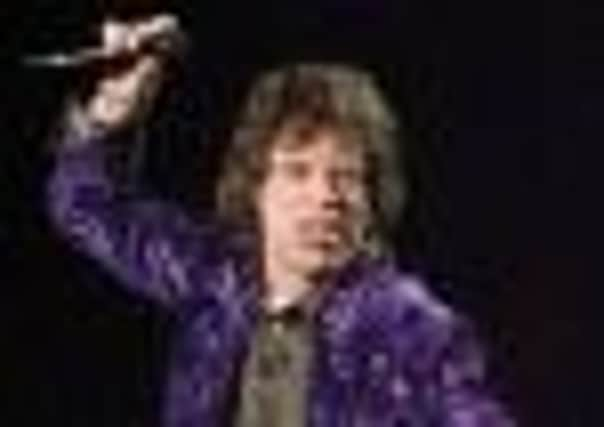Glastonbury takes the Mick with The Rolling Stones


There is no brand of spiritual marzipan it declines to clasp to its rustic bosom. It is easier here to buy a dreamcatcher or a dowsing rod than a loaf of bread, which anyway would be made from spelt and blessed by an ex-vicar named Lytton. On every corner, placards tempt the seeker towards enlightenment, as revealed, inter alia, by the Yogi Dream Retreats of one Kathy Jones, “priestess of Avalon, wounded healer and heart companion”.
It’s like the town was twinned with Middle Earth. You find yourself doubting the evidence of your own third eye. Yet this epicentre of tripe, this fortress of kitsch is to receive a visitation, a manifestation if you will, most fittingly from an entity every bit as preposterous and as susceptible to critical thought as the stuff that keeps the townsfolk in enchanted coracles. In August, the Glastonbury festival is to be headlined by the Rolling Stones.
Advertisement
Hide AdThis is considered very big news, and something of a coup, though anyone who knows anything about the Stones, about the Glastonbury festival or about the trajectory of rock culture in the past four decades can only be saddened and dispirited. The Stones at Glastonbury is like your grandad doing his Alvin Stardust impression at a christening. It is not appropriate. It exposes everyone involved. You want to shout: “What has this to do with you? Why are you here?”
But, then, we knew the answer already. Mick Jagger. For this is a singularly silly individual, and one who stands apart from his bandmates. The other three, Keith Richards, Charlie Watts and Ronnie Wood, are a blithe and amenable bunch, content to go anywhere a big fluffy towel awaits, utterly habituated to playing the same old riffs to the same old riff-raff.
But Jagger is different. For 40 years now this shrewd and vain fellow has been painfully aware his band is essentially a creature of the 1960s, long past its first flush of relevance. He has sought to offset the sad reality wherever he can, by co-opting every contemporary reference possible, from disco to reggae, from Scorsese to high-impact aerobics. Recently he formed a band named SuperHeavy, with Joss Stone and Dave Stewart.
Two incidents stick in the memory: a concert film from the late 1970s when Jagger, resembling a Nazi Yootha Joyce, adopted a Sex Pistols swastika t-shirt, for which he was quite properly ridiculed by everyone from Julie Burchill to the Archbishop of Canterbury; also, an appearance on The Tube when a bloodthirsty Muriel Gray exposed Jagger’s lordly and imperious misunderstanding of South American revolutionary politics, purportedly the subject of his then-current single, Undercover Of The Night.
The appearance at Glastonbury is but the latest example of this failing. No doubt Jagger read in Tatler or somesuch that the festival was groovy and happening. Or perhaps a grandchild asked about leasing an eight-berth mobile home for the duration. Either way, in the Jagger mind, the farthing clearly dropped. And so this ghastly misstep was entrained, even though this really isn’t what the Glastonbury festival is for.
It isn’t merely a big gig, a career gold watch. In as much as 100,000 teenagers rolling in ordure ever can, the festival has, or had, real cultural meaning. This goes back to its roots in the English pop-radical tradition, when the fledgling Marc Bolan and David Bowie or Curved Air would turn up to warble about William Blake and the stars in the sky.
Advertisement
Hide AdThis line continued through new wave and became explicitly political or socially engaged. Something material was signified by which acts were chosen to appear, and the rung on the bill they were allotted. It was the rock equivalent of Debrett’s. And it stayed in place more or less until the recent headlining appearance of the frightful U2, another band with no business being there, at which it was clear that Glastonbury was now nothing but the O2 arena with weather, merely another stop on the circuit; another example of what Edwyn Collins termed “the truly detestable summer festival”.
We’re promised two new Stones songs at Glastonbury. Can you imagine? Picture the rehearsal room at which this sausagemeat is ground out.
Advertisement
Hide AdKeith Richards turns up: “Hey, you cats, I gotta new tune.” He proceeds to play the same choppy riff he’s played for decades, the one that sounds like he’s struggling to detach a lump of chewing gum from his guitar strings.
Jagger flicks through the Daily Telegraph; “Maybe the words can be about, you know, a heartbreaking Spanish senorita? Or the internet? The internet’s gonna be massive. Download My Love, that’s a good title.”
Charlie contributes his usual minimalist rimshot and dreams of playing with George Melly’s Footstompers. Ronnie Wood is punching a toy meerkat.
The Stones have been slopping out this formulaic, steroid-injected eyewash since the Heath administration. One irony is that several Stones contemporaries have demonstrated recently that rock music and gerontocracy can co-exist. Leonard Cohen, Bob Dylan, Johnny Cash, even Tom Jones, for pity’s sake; each has released respectable work of late. The formula is simple: big grainy monochrome portrait on the front, lots of slow acoustic numbers about death’s approach, produced, if possible, by Rick Rubin.
Such, however, is not the path the Stones have chosen, opting instead to remain the rock equivalent of a ride at a Universal theme park, gaudy and noisy, their skeletons rattling loudly as the ghost train heads for the tunnel. Hopefully, after Glastonbury, it will not reemerge and even a wilting trendy like Jagger will accept finally that his gang of dyed and plasticised pensioner mercenaries have become just too, too ghastly.
That said, Glastonbury is the land of eternal life and magic wells. Suddenly, the conjunction makes some sort of sense.
Twitter: @earthworm67